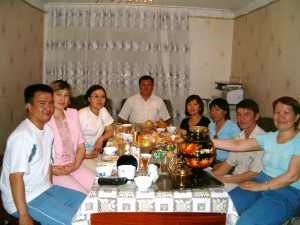I wanted to understand Kazakhstan, but it wasn’t easy.
More to the point, I wanted to understand the people who now called Kazakhstan home.
I learned enough early on to know Kazakhstan and America were similar in many ways: Both
- have diverse populations with multi-generational ethnicities;
- gained independence after many years under the control of another country;
- are large countries, among the top ten largest countries in the world;
- contain large and diverse levels of natural resources.
The Kazakh histories I’d found focused on the land during the reign of the Saks: the blue-eyed blondes in residence long before the Kazakhs got there and who, scholars say, died out long ago. The famous “Gold Man,” the mummified corpse discovered in the foothills outside of Almaty in the early 1960s, was from this era.
That didn’t help me understand the people I’d met and gotten to know a bit. Many were descended, they’d tell me proudly, from those nomads of old who wandered the steppe in search of grazing lands for their various herds.
Others were Russian, descendants of those who were sent to Kazakhstan under the old Czars, to turn the vast grazing steppe into agricultural land (a failed experiment, by the way, with tragic results) or descendants of those filling the gulags that dotted the land.
There were a total of 126 different ethnicities, we were taught. And all were proud of their heritage.

- Gathered around the dastarkhan for chai.
Citizens of Kazakhstan carry identification cards that list their particular “nationality.” The people I met identified with and were proud of their “nationality,” no matter how many generations separated them from their homeland. It was odd for me to make these ethnic distinctions, ones I didn’t make in the US. But they would have felt insulted unless I tried.
Cossacks, for example, are often confused with Kazakhs. Cossacks, Russian and proud of it, are historically a branch of the Russian Tsarist army. They adopted the Cossack name from the bands of nomads to the south, the Kazakhs, known even then for their bravery and horsemanship. Many Cossacks came to Kazakhstan through the Russian military and stayed, just as other Russian settlers did. And there are still pockets of Cossack Russians living in and around Almaty.
Uzbeks and Uighurs, for another example, are also proud of their ethnicity, and it isn’t Kazakh. Tatars and Latvians don’t call themselves Russian; their ancestors were from Tatarstan or Latvia, therefore they are Tatar or Latvian. Koreans are Korean still; Germans, German. You get the idea.
In Kazakhstan, I never did find anyone calling herself or himself a Kazakhstani. Proud to live in Kazakhstan, yes. Plenty are proud of their new country. But their identity is still tied to their ethnicity, (what they call nationality). With the Kazakh people, this is easy. They are Kazakh, descended from nomads and Ghengis Khan, and proud of it. It’s the other 125 ethnicities that made it so confusing.
The US has African-Americans, Asian-Americans, Hispanic-Americans, and Polish-Americans among many others. In Kazakhstan, with 126 different ethnicities when we were there, there are no such hyphenated identities.
Our African, Asian, Latino, and European immigrants morph, eventually, into Americans. Whether you adopt the melting pot model or the mosaic, these diverse populations, over time, become citizens of one country. But in Kazakhstan, this hasn’t happened yet. No one refers to himself or herself as Kazakhstanis, the official word for “citizen of Kazakhstan.”
Yes, in Kazakhstan I found no Kazakhstanis.

KM Huber
Although I don’t always comment, I just want let you know how much I enjoy learning about in your time there. In particular, I like the idea of deleted scenes but that said, each post reveals the people so intimately that I think of them as I would characters in a novel. I know your interest is memoir but just know there is a great story element here.
KM
Janet
Thanks Karen. I’m always so glad when you show up. I too love the idea of deleted scenes. It certainly makes it much easier to kill these “darlings” of mine, in the parlance of Stephen King, when I know they can live on here on my Blog. Thank you for being so generous with your comment.
I too lurk on your blog; always well written, heart-felt, and though-provoking. I get it weekly on Monday mornings so, often by the time I read it, most of your following has already commented.
Belinda Nicoll
Janet, it’s wonderful that you investigated the culture with such curiosity. The ethnic identity phenomenon that you describe in this post works the same in South Africa. Referring to someone as an Afrikaner or Englishman or Jew or gay or whatever does not smack of political incorrectness as it does in the U.S.
Best,
Belinda.
Janet
Hey Belinda. Thanks for that. In the early years of the US, most folks identified more with their state that with the country. I wonder if its the same phenomena
It was often hard for me to tell which differences were uniquely Kazakh, which Russian or Soviet, and which ones not cultural at all, but an individual idiosyncrasy. “Which differences make a difference,” as Gregory Bateson says, that’s the important part.
Diana Beebe
This is so interesting, Janet! I really enjoy reading and learning from your posts. Thanks!
Janet
Hi Diana, So glad you stopped by again. Thank you. I find the differences between cultures endlessly fascinating, but I’m not sure how widespread that feeling is. So it’s great to hear that you are enjoying them.